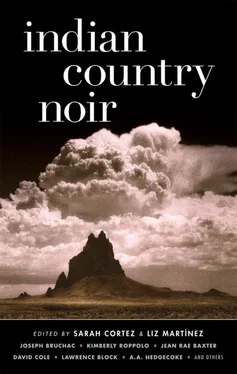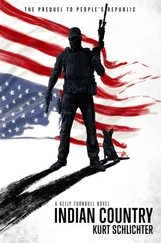Mistina Bates - Indian Country Noir
Здесь есть возможность читать онлайн «Mistina Bates - Indian Country Noir» весь текст электронной книги совершенно бесплатно (целиком полную версию без сокращений). В некоторых случаях можно слушать аудио, скачать через торрент в формате fb2 и присутствует краткое содержание. Город: New York, Год выпуска: 2010, ISBN: 2010, Издательство: Akashic Books, Жанр: Детектив, на английском языке. Описание произведения, (предисловие) а так же отзывы посетителей доступны на портале библиотеки ЛибКат.
- Название:Indian Country Noir
- Автор:
- Издательство:Akashic Books
- Жанр:
- Год:2010
- Город:New York
- ISBN:978-1-936070-05-3
- Рейтинг книги:4 / 5. Голосов: 1
-
Избранное:Добавить в избранное
- Отзывы:
-
Ваша оценка:
- 80
- 1
- 2
- 3
- 4
- 5
Indian Country Noir: краткое содержание, описание и аннотация
Предлагаем к чтению аннотацию, описание, краткое содержание или предисловие (зависит от того, что написал сам автор книги «Indian Country Noir»). Если вы не нашли необходимую информацию о книге — напишите в комментариях, мы постараемся отыскать её.
Indian Country Noir — читать онлайн бесплатно полную книгу (весь текст) целиком
Ниже представлен текст книги, разбитый по страницам. Система сохранения места последней прочитанной страницы, позволяет с удобством читать онлайн бесплатно книгу «Indian Country Noir», без необходимости каждый раз заново искать на чём Вы остановились. Поставьте закладку, и сможете в любой момент перейти на страницу, на которой закончили чтение.
Интервал:
Закладка:
She left the bed, reached into her purse, found the knife. She let him see the blade. She let the tip of the blade graze his cheek as she mounted him one more time.
“God, it’s bigger than ever,” she told him. “You’re in pain now, aren’t you? Oh dear, I’m afraid it’s going to get worse. Well, more intense, anyway. Optima futura , you know. That’s Latin. It means the best is yet to be. For me, that is. For you, well, maybe not.”
She left with close to five thousand dollars in cash and chips, and stopped downstairs at the cashier’s cage to turn the chips into currency. Then she got in her car and started driving.
She’d left his one-dollar chips in the room. She’d left his credit cards too, and a gold signet ring that had to be worth a few hundred dollars. She took the slide from his string tie, just because she liked it, and she took her cuffs and cords and scarves, because it would be a nuisance to replace them. But she left the elastic band in place.
And she took the scalp, tucked away in a plastic bag. It was just such good theater to scalp him, what with having been drawn to his hair in the first place, and then the whole Indian motif of their encounter. Before she was halfway done with the process she regretted having begun it in the first place, because even minor scalp cuts bleed like crazy, and when you scalp a person altogether — well, the Indians probably waited to scalp people until they were safely dead, and disinclined to bleed, but she went ahead and finished what she’d started, and it was almost worth it when she shook the scalp in front of him and let him gape at it.
She’d cleaned up her fingerprints, but she knew she’d left plenty of DNA evidence, and people at the casino could furnish a description of her. But she’d been working variations on this theme for a good long while now, and she always got away with it, so she figured all she could do was play out the string. And she’d ditch his scalp where it wouldn’t be found, and the scalping would guarantee a lot of press, along with a manhunt for some unforgiving Indian seeking vengeance for Wounded Knee.
Yes, she’d just go ahead and play out the string. Because it kept getting better, didn’t it? Optima futura. That pretty much said it all.
Prowling wolves
by Liz Martínez
Chicago, Illinois
The Pima Indian huddles on the ground in the foxhole, his M1 rifle propped upright between his legs. He is awake and watchful while his fellow marine, Bill Faulkner, curls up nearby, getting some shut-eye. The darkness is pervasive, and he sees what he thinks might be shadows. Or maybe they aren’t. He keeps his ears open, straining to make sense of the rustling noise. Other marines? The enemy? There isn’t any way to tell.
The most important thing is not to fall asleep. He’s responsible for keeping himself and Faulkner safe. He has to stay awake. It’s not a problem for him, though. If he gets sleepy, he just concentrates on the smell. In the two days they’ve been on Bougainville, the marines of Easy Company have been pinned down in their foxholes in a monsoon, then trapped under the scorching sun. They all stink.
He turns his head, trying to match shapes to the rustles he hears. He can see better in the darkness out of the corner of his eye than by looking at objects straight on. The change of position causes the stench to hit him again. Not just his own rank body odor, but the smell of blood. And guts. And decaying bodies. Already, there are bodies ready to be shipped home. Young men who knew they’d be the lucky ones to make it back to America — but they’d figured on doing so alive.
He glances over at Faulkner. He’s glad his buddy is able to get some sleep, but he can’t figure out how the guy can do it. The adrenaline courses through his own body, keeping him from ever really sleeping. This isn’t new. Even back home on the reservation, he could hardly rack up any sack time. Instead of adrenaline, feelings of guilt, remorse, and shame would torture him in the nighttime. Not over anything specific. Or rather, over everything. A white man’s purposeful slight. A buddy who made a thoughtless remark. Anything, really. During the day, he could find ways to cope. But at night — that was different.
He turns his head again to try to see what’s going on in the darkness around them. He doesn’t hear or see anything, but he strains to listen and penetrate the darkness anyway.
He feels an abrupt thud that reverberates down his arms, and he hears screaming right next to him. The adrenaline courses through his body at full speed. He doesn’t know what just happened, but his rifle seems to have a mind of its own, jerking and pulling out of his hands. He grabs it back by reflex.
All of a sudden, he realizes what’s going on. An enemy soldier tried to sneak up on him, and when he moved to attack, impaled himself on the Indian’s bayonet at the end of the rifle.
He yanks the rifle back, pulling the bayonet out of the Jap’s stomach. He’s running on animal instinct now. He picks up the rifle in both hands and punctures the enemy soldier’s body over and over. He’s stabbing the man with his bayonet, but the man keeps moving. He knows he must kill him or be killed. So he keeps thrusting. Again and again, he heaves the rifle downward, pulls it back, hurls it into the man’s body.
He is so consumed with his own personal combat that he’s in another world. “Chief, stop! He’s dead. You killed him. Knock it off!”
He can hardly hear the other marine over the roar in his ears. He’s barely aware of the guy’s hand gripping his shoulder, shaking him. “Ira. Ira!”
His lids popped open. Sergeant Beech’s fingers squeezed his shoulder at the nerve point, sending the pain radiating down his arm. The Indian twitched to shake the sergeant’s hand off. Beech gripped him by the upper arm to lift him to his feet. The roar of the audience’s applause subsided as Rene Gagnon sat down next to Ira on the dais again. Gagnon shot him a disgusted look and turned back to his dessert.
The Indian stood up, stretched, and opened his mouth in a huge yawn. The audience responded in kind. They looked like a sea of goldfish swimming toward the surface for food. Beech grinned. This gave him a kick every time it happened.
He shoved Ira toward the microphone. “Tell ’em...”
But the Indian knew what to do. He stood before the microphone and confronted the audience of Chicagoans who had turned out to see the heroes. His mouth always got dry at this point. He was never a man to use many words, and his vocabulary seemed to abandon him in front of a crowd.
“I hope you buy lots of war bonds,” he said.
He sat down again.
The crowd in the hotel ballroom erupted in applause and cheering. Ira wasn’t really aware of them. He was busy looking around. Beech knew what he wanted and leaned down to whisper in his ear. “Later, chief.” He patted the Indian’s shoulder reassuringly.
Ira didn’t want to wait until later . He needed some booze now. He was thinking about how to attract the waiter’s attention without attracting the attention of the audience. He barely heard Bradley, now at the microphone, denying they were anything special.
“We’re not heroes.” Bradley gestured to himself, Gagnon, and Ira Hayes. “We just put up a flag. The real heroes are the ones who died fighting on Iwo Jima. Please buy war bonds to honor their memory.”
The crowd went wild. The band started up again, and the room exploded in a cacophony of chatter, laughter, and music.
Beech slapped Ira on the shoulder. “Come on, buddy. Let’s go.”
Ira got up eagerly. Keyes Beech was always ready to bend an elbow.
Gagnon sneered. “What’s the matter, chief? Can’t wait to start drinking again? Fuckin’ drunken Indian.” He muttered the last part.
Читать дальшеИнтервал:
Закладка:
Похожие книги на «Indian Country Noir»
Представляем Вашему вниманию похожие книги на «Indian Country Noir» списком для выбора. Мы отобрали схожую по названию и смыслу литературу в надежде предоставить читателям больше вариантов отыскать новые, интересные, ещё непрочитанные произведения.
Обсуждение, отзывы о книге «Indian Country Noir» и просто собственные мнения читателей. Оставьте ваши комментарии, напишите, что Вы думаете о произведении, его смысле или главных героях. Укажите что конкретно понравилось, а что нет, и почему Вы так считаете.












